Italians keen to gamble on unelected Matteo Renzi
- Published
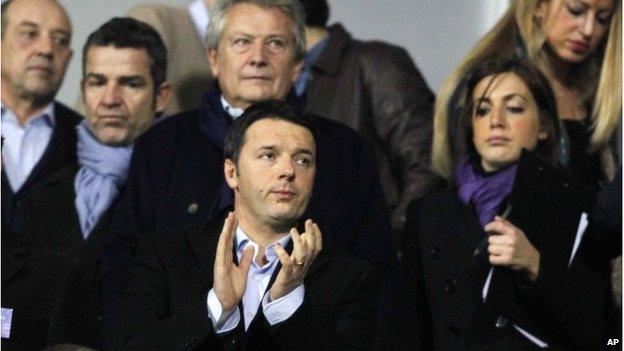
Loyal to the local side despite his rise to the national stage, Mr Renzi watches Fiorentina play on Saturday
Italy is about to gamble. It is placing its bet on youth, on style, on energy. And on the unknown.
Almost certainly, Matteo Renzi will be sworn in as prime minister in the next 48 hours.
He is 39 years old, which will make him the youngest Italian prime minister since the war. Younger by two months even than Mussolini when he took power in 1922.
Matteo Renzi is not even an MP. He is the mayor of Florence.
An American-style politician with an easy smile, he crackles with energy and vaulting ambition. Some are calling him Italy's Tony Blair - a pragmatic centre-left politician with little use for ideology.
His appeal lies in being different, in being the outsider. He is ruthless too. He had previously pledged to seek power via an election, but last week engineered the removal of the sitting Prime Minister Enrico Letta by calling a vote for his removal at a meeting of their Democratic Party.
He is known as "scrapper" - a politician who promises to break the power of the old guard, of the political caste, of those often invisible networks that still influence so much in Italy.
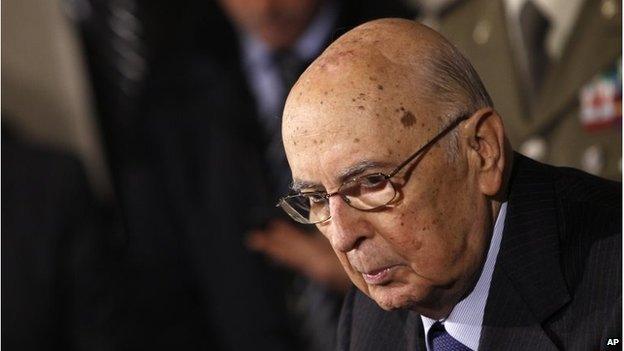
Italy's democratic deficit grows - Mr Renzi will be the third prime minister appointed by President Napolitano without having won an election
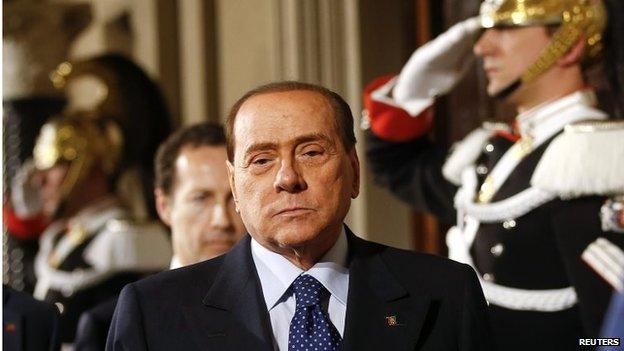
Silvio Berlusconi - convicted and banned from political office - can still influence a Renzi-led coalition
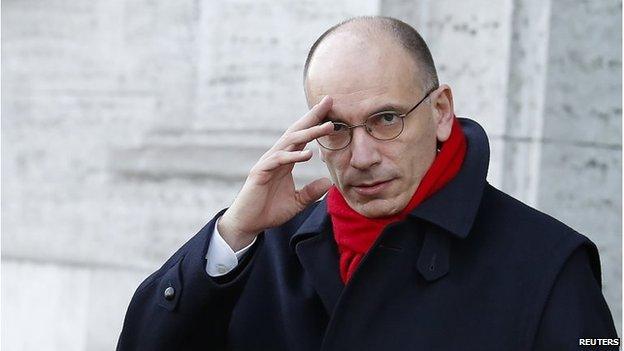
Enrico Letta departs blamed for having enacted few reforms during his relatively brief time in office
Renzi travels with little political baggage. He is a former boy scout, a young winner of the Wheel of Fortune, a passionate supporter of Florence's football team Fiorentina, and mayor of that city for under five years. He likes casual, open shirts and leather jackets.
His appointment could be an Italian revolution. His strength is drawn almost exclusively from his personality. He embodies change, and for many Italians that is enough. They will, for the time being, embrace style over substance. Renzi says he wants to tear up the old networks. "Italy," he says, "is living in a moment of difficulty. We need to offer the possibility to emerge from this morass... with a radical programme to re-launch the country."
His hope is that popular support will buy him the political space to embrace major reform: to open up the Italian economy, to make hiring and firing easier, and to go for growth. In exchange for implementing reforms, he is likely to seek an easing of the targets set by Brussels for reducing Italy's budget deficit.
But for all his likeability, he is untested. His weakness is that he will have manoeuvred himself into power unelected, with no popular mandate. He will be the third Italian prime minister appointed by the president rather than the people. Democracy is fraying in Italy. It is no longer the will of the people that decides who sits in Palazzo Chigi, the prime minister's official residence.
Such is the frustration with the political class that many Italians seem prepared to gamble on the unelected if the appointment brings with it meaningful change and rescues a long-sclerotic economy just barely out of recession.
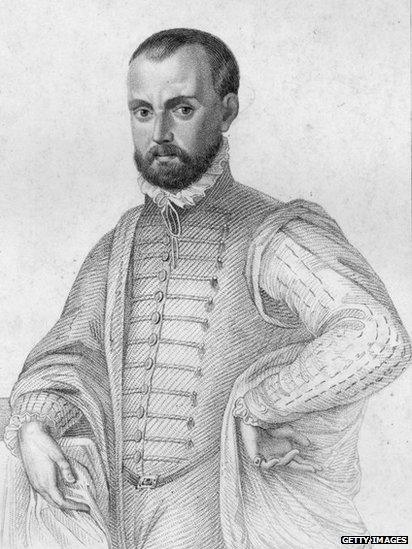
Another ruthless Florentine with possible lessons for the new prime minister: Niccolo Machiavelli
Silvio Berlusconi, despite his court convictions and ongoing legal battles, still wields considerable influence. He immediately raised the doubt about "giving life to the proposal of a new government without having heard a word about what the programme of the government will be" - although he also promised "responsible opposition". Another opposition politician said "we cannot guarantee a happy ending".
The maverick comedian-turned-politician Beppe Grillo, who leads the Five Star movement, is scathing about another unelected prime minister and talks darkly of a "coup". But despite their doubts, most politicians are likely to co-operate for the time being, because they fear Renzi's appeal at the polls.
The centre-left in Britain and France are eyeing him cautiously. If he succeeds, they could all be boosted. If he fails, it could usher in a bitter election and fears of social unrest.
Renzi seems to be following the advice of another famous Florentine, Niccolo Machiavelli, who observed, "I am not interested in preserving the status quo. I want to overthrow it."
Matteo Renzi is about to be given the chance to shake up the Italian political system. And many Italians, weary of high unemployment and corruption, seem willing to give him the chance.
- Published15 February 2014
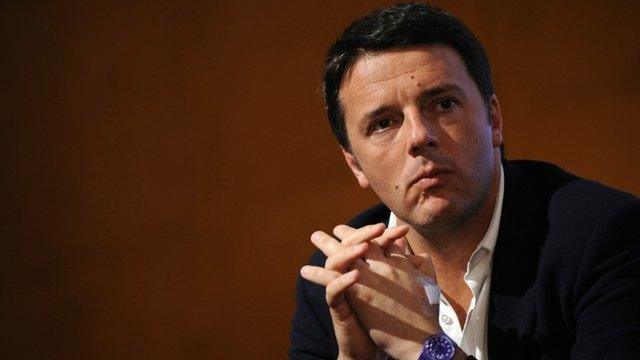
- Published14 February 2014
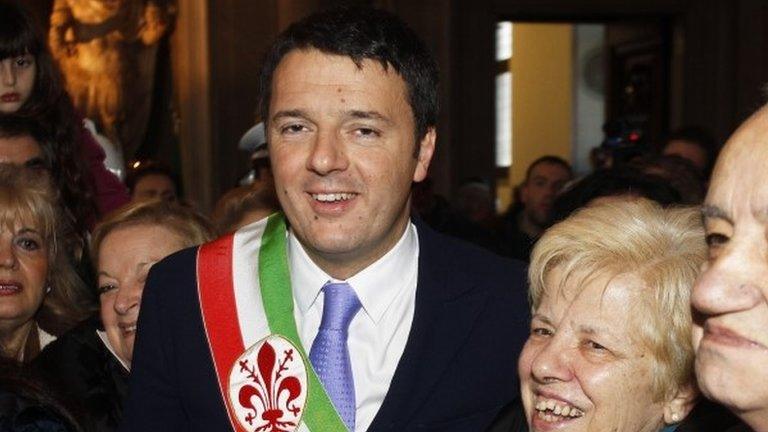
- Published14 February 2014
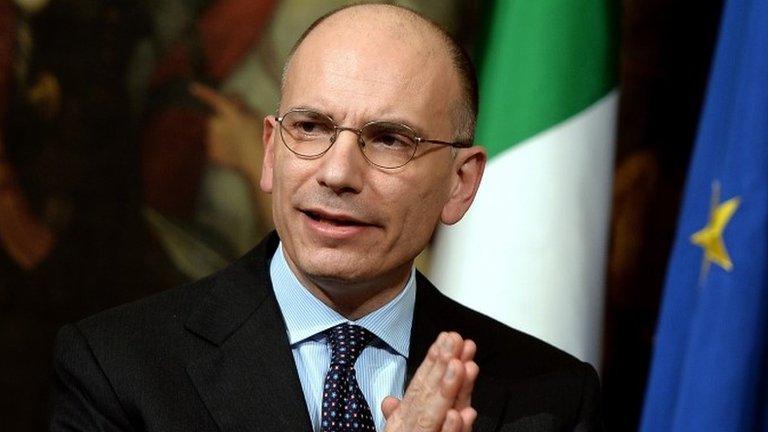
- Published14 February 2014
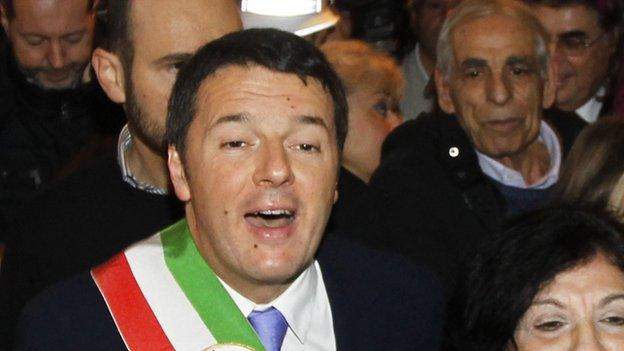
- Published5 May 2015